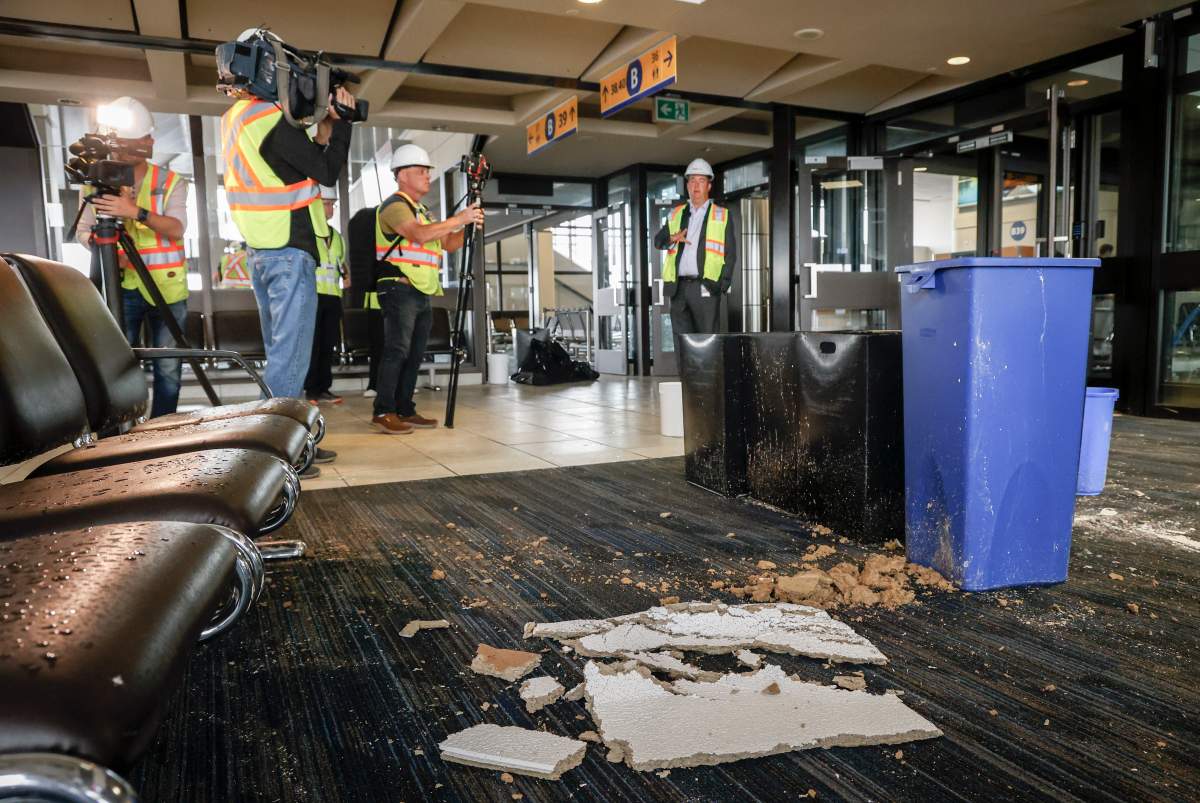Experts say airfares may go up in the immediate aftermath of a hailstorm that tore through Calgary on Monday evening, damaging planes at WestJet and Flair Airlines and upending travel plans for thousands of passengers.

Hailstones as big as golf balls pummelled the airport tarmac, forcing both airlines to ground 10 per cent of their fleets for repairs and inspections.
WestJet said it cancelled 248 flights between Monday and Wednesday, and will have to cut trips across its network for the “foreseeable future.”
The Calgary-based carrier cancelled 106 more trips on Thursday and Friday, according to tracking service FlightAware. Flair has also had to trim its schedule, while Air Canada saw a smattering of planes affected.
A significant scale-back will likely boost demand at other airlines and push up ticket prices during the peak summer travel season, said Barry Prentice, who heads the University of Manitoba’s transport institute.
“This is going to have a real impact on a lot of people who are waiting for flights. You can’t take 10 per cent out of the supply of the second-largest airline in the country and not have impacts,” he said.
Longer term, more violent and volatile weather patterns could boost carrier costs such as maintenance and insurance, an expense that will likely trickle down to travellers.
“Of all the transportation modes, they’re the most susceptible to weather,” Prentice said of airplanes.

WestJet said it managed to move four of the 22 planes that were on the ground in Calgary into a hangar for protection. Sixteen were “significantly damaged” while another two were cleared with minor damage, the company said in a statement Wednesday. Nine other planes were diverted.
“The severity and direction of the actual thunderstorm and hail became clear less than 30 minutes before impact, and we are extremely appreciative of our people who took quick action, prioritizing safety above all while limiting damage to our fleet and operation, wherever possible,” said chief operating officer Diederik Pen.

Get breaking National news
Flair Airlines CEO Maciej Wilk said two of the budget carrier’s 20 planes are out of commission due to the storm but will be back in the sky within a couple of weeks. None suffered structural damage, he said.
“We have a lot to do. You can imagine if there are thousands and thousands of those tiny bits of ice hitting the airframe, you need to really spend time reviewing if there’s not any damage,” he said in a phone interview.
The Edmonton-based airline has had to cancel some flights and delay others as a result, though “reserve capacity” has helped fill the gap, Wilk said.
“It is tough,” he added.
“I would lie by saying that it doesn’t hit us in any way.”
Passengers whose flights were cancelled due to the storm are entitled to a refund or alternate reservation free of charge if they could not be rebooked within 48 hours.

Rick Erickson was at his home in northwest Calgary when he saw the storm clouds looming.
“It missed me, but it cut a vicious swathe in northwest Calgary right through the northeast, including the airport,” the aviation consultant recalled.
The storm damaged the airport roof, causing ceiling tiles to come crashing down as water poured in and flooded parts of the domestic terminal, where some sections were closed temporarily.
The ice chunks may also have wreaked havoc on the airplanes’ less durable parts.
“The various ailerons and rudders and the like are not as robust as the fuselage is because these are moving parts and quite often they need to get changed out,” Erickson said. “They would have got damaged.”
Even the main body of some planes were dented by the oversized pellets, demanding further repairs.
“If you dimple the fuselage, you really increase the resistance of the aircraft as it’s moving through the air and you create a lot more drag,” Erickson said.
Air Canada said operations in Calgary returned to normal on Wednesday.
“We had a handful of aircraft on the ground during the storm; we have been inspecting and returning these to service,” said spokeswoman Angela Mah.

At WestJet, the hundreds of cancelled flights likely affected more than 10,000 customers, said John Gradek, who teaches aviation management at McGill University.
As the airline packs passengers onto other flights, those looking for last-minute tickets may pay a premium.
“The dynamic pricing algorithms that both Air Canada and WestJet use will automatically sense a demand situation showing up,” Gradek said, also referring to the smaller supply of seats this week.
“If you do find a seat, it’s going to be more expensive.”



Comments